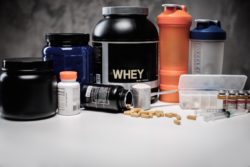Top Class Actions’s website and social media posts use affiliate links. If you make a purchase using such links, we may receive a commission, but it will not result in any additional charges to you. Please review our Affiliate Link Disclosure for more information.

However, some companies have bent and twisted the truth to their benefit at the expense of the consumers who are helping to line their pockets.
However, some companies have bent and twisted the truth to their benefit at the expense of the consumers who are helping to line their pockets.
A prime example of deception in advertising surrounds a practice known as protein powder spiking, also known as amino spiking or nitrogen spiking. Manufacturers who engage in this process have found they can put less actual protein in their supplements while having the products reveal higher protein counts when they are independently tested.
How Protein Powder Spiking is Done
The amount of protein in a product is measured by measuring the nitrogen content in the product which is then converted into the protein content. Testing using nitrogen is used because proteins are made up of amino acids and amino acids contain nitrogen. So, measuring the nitrogen in a product should ideally reflect its protein content.
However, while amino acids are the building blocks of proteins when these protein products are tested, it is assumed that they contain complete proteins. With protein spiking, this is not the case.
Complete proteins include egg protein, whey and casein (milk protein). Many products contain these complete proteins, but they also have added in incomplete proteins from the nitrogen protein powder spiking process; therefore, when the protein testing is performed, the nitrogen content (supposedly reflecting the protein content) is much higher than the actual complete protein content due to those added amino acids.
One might think that the additional amino acids added to a product are a good thing since they are the building blocks of protein. The problem with protein powders is that these additional amino acids are not added to provide a benefit to the product, rather they are just added for their nitrogen content.
The amino acids that are added to these products are much cheaper than complete proteins, so by adding the less expensive amino acids in protein powder spiking, product manufacturers can artificially inflate their nitrogen content, which shows up as higher protein content based on the nitrogen testing, enabling them to fluff their nutrition labels.
Another consideration is that there are some amino acids that are not proteogenic, meaning that they are not used as the building blocks for protein. One such amino acid is taurine, which is a supplement helpful for energy production. Yes, it may be good to have this supplement added, but when it is added at the expense of the protein you are supposedly getting based on the label, you are still being duped by the manufacturer.
Taking Legal Action over Protein Powder Spiking
Consumers who have come to learn about protein powder spiking are taking matters into their own hands and fighting back against companies who are using unethical measures to sell their products.
A proposed class action lawsuit has already been filed over these same allegations. The lawsuit reads, “The Products at issue in this case include all protein supplements manufactured, distributed or sold by the Defendants under any brand name including but not limited to the following: Core Formulations / CF, Core 8, IsoCore, and APEX; BioHealth Precisions ISO, and Rogue Nutrition –Rogue Whey.”
If you have purchased any of Core Health, BioHealth or Rogue Nutritions supplements yourself, you may be able to take legal action against the manufacturer.
Plaintiffs in these types of lawsuits often seek to have the companies stop their unethical and illegal actions, be punished for their wrongdoing, and to compensate consumers who were duped by the false claims made by manufacturers.
If you have purchased any of the supplements above, you can have your case reviewed by an attorney free of charge to determine if you are eligible to participate in a class action lawsuit against the manufacturer over protein powder spiking allegations.
Join a Free Protein Powder False Advertising Class Action Lawsuit Investigation
If you purchased any of the protein powders listed below, you may qualify to file a protein powder lawsuit or protein spiking class action lawsuit.
- Core Formulations Core 8 & IsoCore
- Rogue Nutrition Rogue Whey
- BioHealth Nutrition Precision Blend & Precision Iso
ATTORNEY ADVERTISING
Top Class Actions is a Proud Member of the American Bar Association
LEGAL INFORMATION IS NOT LEGAL ADVICE
Top Class Actions Legal Statement
©2008 – 2024 Top Class Actions® LLC
Various Trademarks held by their respective owners
This website is not intended for viewing or usage by European Union citizens.














